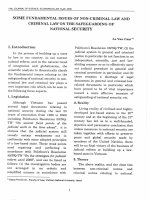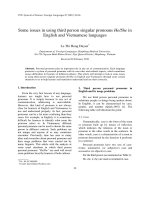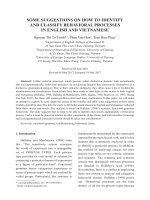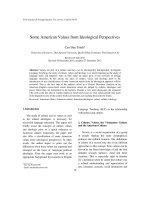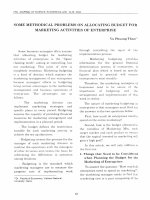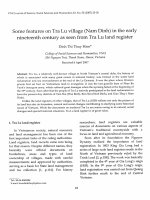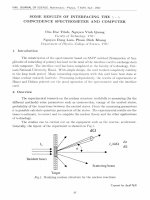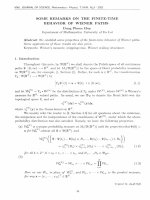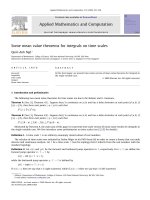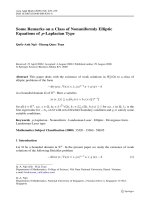DSpace at VNU: Some issues concerning the protection of trade secret and the completion of trade secret protection legislation in Vietnam
Bạn đang xem bản rút gọn của tài liệu. Xem và tải ngay bản đầy đủ của tài liệu tại đây (4.55 MB, 10 trang )
VNU. JOURNAL OF SCIENCE, ECONOMICS-LAW, N01E, 2004
SOME IS S U E S CONCERNING THE PROTECTION OF TRADE
SEC R ET A N D THE COMPLETION OF TRADE SECRET
PR O TECTIO N LEGISLATION IN VIETNAM
N gu yen Thi Que A nh(,)
Trade
secret
of
m echanism of V ietn am w ith those of other
intellectual p ro p e rty rig h ts is one of the
developed nation s which have a lot of
categories
which
extensively
as
the
has
studied.
object
been
not
experience in this field as well as compare
addition,
the
th e
still
In
re q u ire m e n ts
for
tra d e
secret
in te rn a tio n a l
treaties
p a rticip ated
or will
application of th e s tip u la tio n s related to
protection
tra d e secret is too little if we don’t w a n t to
th a t V ietnam
say th a t it h as not been in existence in
p articipate in. Then, the a u th o r advances
reality. The form ation of th e tra d e secret
some proposals, aim ing a t completing the
protection
re g u la tio n s
tra d e
legislation
can
be
considered
incomplete.
On
th e
o th e r
in
V ie tn am ’s
to
h an d,
to th e
has
secret
protection
legislation
in
Vietnam.
be
son e
1. An O verview o f th e Trade S ecret
P ro tectio n L eg isla tio n S ystem in
the W orld
scholars have show n t h a t a t p re s e n t the
shortcomings of th e tr a d e secret protection
system usually cause more inhibition to
Trade secret is one of the traditional
foreign in v estm en t th a n the lim itations in
the
protection
of
o th e r
objects of intellectual property rights. In
intellectual
th e
property objects {4, p . 88 }. Therefore, the
completion of
legislation
tr a d e
not
only
secret
up
secret.
up
th e
economic
U ntil
the
tr a d e
secret
of
secret
didn’t
seơret
of a
p articu lar
th e
In d u s tria l
n a tu re
Revolution
in
of know-hows and
tra d e secrets h ad gradu ally changcd. The
fe a tu re s of tra d e s ec re t protection as the
co m pare
professional
th e
Europe, the
the aspects of tra d e secret notion and the
property
notion
individual.
In this article, th e a u th o r will pre sen t
of in d u s tria l
Vheir
knowledge,
growth
th ro u g h foreign in v e s tm e n t attraction.
object
th e
exist in docum ents, b u t it simply was the
region and the world b u t also contributes
speeding
before
w orkers h a d conserved th e ir professional
the
in tegratio n process of V ietnam into the
to
days
intellectual property w as first used, skilled
protection
speeds
old
complexity of th e production process and
rights,
th e wide-open re lation sh ip s required to
protection
have a record and p a p e r system and a t the
sam e
n Dr., Faculty of Law, V ietnam National University,
Hanoi.
tim e
offered
employees
the
possibilities to change th e ir employers.
35
36
N guyen T h ỉ Q u e Anh
From t h a t time, th e two tre n d s which
employees (eg: customs officers, policemen...)
th re a te n e d the e n tire ty of know-hows and
are u n d e r an obligation not to reveal the
tra d e
th e
secrets they approach w hen th ey do th e ir
unfaithful a ttitu d e of some w orkers to
work th ro u g h the special contracts. This
th eir ex-employers occurred; second, the
model exists in G re a t B ritain a n d in some
documents and p a p ers re la tin g to these
of its colonies such as A u stra lia a n d India.
secrets were stolen. To settle a p a rt of this
In A ustralia,
situation,
the
p a rtic u la r tra d e secret protection law, but
provisions
the legislation of A ustralia is applied to
have
a
exam ine th e civil and crim inal liabilities to
liability to keep secret th e know-hows and
those who m ake m istakes in revealing
the tra d e secrets th e y approached during
secret inform ation illegally (3, p. 59- 64).
secrets
employers
employment
which
emerged:
introduced
contracts
required
First,
th e
employees
in
to
work process. It w as considered as an
effective method of resistin g employees’
unfaithful a ttitu d e s as well as th e stealing
of th e secret inform ation m entioned above.
T ie sta te passed th e law system to re sist
this
situation
by
s tre n g th e n in g
the
sanction m easu res to deal w ith the people
who violate the liability above.
for exam ple
th e re is no
In some o th er countries, besides the
mode of tra d e secret protection thro ug h
th e a d ju stm e n t of th e employer-employee
a n d tra d in g p a rtn e r relationships, th ere
a re regulations rela ted to th e protection
for this object, which are s ca tte re d in
different legal docum ents such as the laws
a g ain st u n fair competition, of inform ation
So far, in most of countries in the
and
inform ation
protection
and
the
th e protection of tra d e secret h as
operations of ju d g m e n t office, tax office
bren given an a p p ro p ria te position in the
and insurance office,... This fact exists in
law system s which protect the goals of
some countries such as G erm any, Austria,
people’s intellectual work. However, in the
Italy a n d Russia.
w )rld ,
developing
countries
w ith
a
little
experience in th e protection for intellectual
property in general a n d tra d e secret in
particular, the se ttle m e n t of th is m a tte r is
qiite different.
In some countries, the protection for
tra d e secret is im plem ented on th e basis of
p a rtic u la r law docum ents of th is object,
combined w ith a few stip ulation s in o ther
law
documents.
In
1979,
America
secret
introduced th e general law of tra d e secrets
protection is prim arily im p le m e n te d on th e
(The Uniform T rad e Secrets Act). The
bisis of the con tract signed by employers
tra d e
aid employees or by tra d in g p a rtn e rs. The
defined by the law system s of th e states,
liibility of revealing secret inform ation is
basically su itable to this law. A m erica’s
e:amined
civil
law of trade secret protection is appreciated
relationships betw een th e p a rtie s to the
and considered as one the most perfect law
contract.
system s in this field (5, p. 8).
In
some
in
In
countries,
the
scope
addition,
th e
tra d e
of
the
civil service
secret
protection
is
specifically
VNU, Journal o f Science, Econom ics-Law, N„IE, 2004
Some issues co n c e rn in g the protection of.
In
som e
o th e r
37
countries,
the
mechanism of tra d e secret protection is
g u aran teed by th e general stip ulatio ns of
labour law, civil law and crim inal law. The
laws of som e countries such as France,
Poland, S w itz e rla n d provide tra d e secret
know n as tra d e secret; (3) s tre n g th e n in g
liability, including crim inal liability a n d
civil liability to th e s ta te civil s e r v a n ts
working in th e fields related to t r a d e
secrets.
the mode of lab ou r relationships, employees
In
addition,
th e
re la tio n s h ip s
concerning tra d e secret protection are a lso
adjusted to conform w ith th e mode of
have
relating
protection in th e following directions:(l) In
responsibility
to
protect
secret
in te rn a tio n a l
conventions.
In
to
1900, in th e conference of considering a n d
th e ir ex-employers when
modifying Convention P a ris of in d u s tria l
they te rm in a l th e ir work contract; (2 ) the
property rig h ts in Brussels, the rig h ts
civil liability of th e people who propagate
a g ain st
the secret inform ation which is assigned
supp lem en ted in the mode of th e object of
by the o th e rs or called “t r u s t a b u se ”; (3)
in d u stria l property, which were protected
in accordance w ith th is convention. Article
lObis provides: the m em ber countries h av e
information
and
compete w ith
the
crim inal
are
liability
not
th e
allowed
s ta te
civil
servants and the officials of the offices which
examine
th e
secret
inform ation
u n fa ir
responsibility
to
competition
e n su re
for
w e re
the
o th e r
m em bers’ citizens th e effective liability
a g ain st u n fair competition actions, each of
propagation.
Finally, a n o th e r mode of tra d e secret
protection is to protect m ainly th e legal
the
u n fa ir
competition
actions
is
u nderstood to be any actions again st the
docum ents of each production or business
h on est custom s in in d u s try a n d business.
unit,
which
is
usually
called
“law
of
em ployees’ behaviour ru les'. This mode is
The seizing of secret information on
technology or tra d e secret is obviously
applied in J a p a n (1).
considered
It is possible to find in reality th a t the
trade secret protection in each country in
the world is different in th e approach to
settling problem s on th e one h a n d and has
certain common tre n d s on th e other. The
common tre n d s a re as follows: ( 1 ) T here is
no p a rtic u la r tra d e secret protection law
(America can be considered an exception.
Because of the high independence of the
states in legislation, it is necessary to have
a common tra d e secret law to e nsu re the
unity of a d ju stin g the re la tio n sh ip s of this
object); (2 ) e n h an c in g th e responsibility of
employees to protection for th e inform ation
VNU. Journal o f Science. Econom ics-Luw, N J E , 2004
to
be
“a g a in s t
the
honest
custom s
in
in d u s try
and
bu siness”
m entioned above. Thus, it is possible to
consider this as th e first intern atio nal
article
which
provides
indirectly
the
protection for th e inform ation considered
as tra d e secret.
U ntil the end of th e tw e n tie th century
the protection for th e object mentioned
above
w as
recorded
in
te rm s
of the
regulations of the protection for secret
inform ation as th e object of intellectual
p roperty rig h ts in th e m u ltilateral trade
a g re em e n ts
on
th e
tra d e
aspects
of
N guycn Thi Que Anh
38
intellectual
property
rig h ts
(TRIPS).
trade secret h a s a wide ra n g e of specific
Article No 39.1 of this a g re e m e n t provides:
“to ensu re th e effective protection against
features.
unfair
in
subject to a set of c ertain knowledge (4, p.
article No lObis of th e P a ris Convention
5). The legal tool in th e h a n d of trad e
(1967), the m em ber countries m u st protect
secret ow ners can allow th e m
the
certain ability to re s ist th e violations of the
competition
secret
actions
inform ation
provided
and
docum ents
handed to the governm ent or
governm ental offices...” Moreover,
the
the
mentioned article provides some specific
regulations
of
secret
inform ation
protection. R em arkably, th e term “secret
inform ation” is used in th is article to insist
on the fact th a t th e protection for this
object m ust be larg er th a n th e conceptions
which have existed for over h a lf a century;
for example, tra d e secret, know-how, the
The
basis
of
tra d e
secret
protection is th e real monopoly of certain
to have
people around, b u t th e se tools are not as
effective as those of th e o w ners of other
intellectual property rights. Therefore, the
existence of juridical capacity of trade
secret ow ners d epends on them selves, the
com prehensiveness
the
and
effectiveness of
m e asu re s which th e
ow ners apply
aiming a t protecting th e ir exclusive rights
of th e information.
list of tra d in g p a rtn e rs, TR IPS is the most
The next fe a tu re is th e high generality
comprehensive m u ltilate ra l a g re em e n t on
of tra d e secret. If invention, industrial
trad e secret protection.
design, tra d e m a r k a n d o th e r objects of
T rade secret is one of th e contents
related to the intellectual property rights
mentioned in the V ietnam - America Trade
Agreement.
Basically,
th e
stipulations
related to the Paris Convention and TRIPS
A greem ent is considered to be th e basis of
the
two
countries’
responsibilities
to
intellectual property rig h ts can be defined
as the products of creative work, trad e
secret can be defined as various m aterials
related
to
information,
technological
m a n ag e m e n t,
finance
and
different operation aspects of trade. Trade
secret can be the solutions which can be
protected
protect this object.
production,
as
invention,
trad em ark ,
industrial design, b u t for one reason the
2.F eatu res o f T rade S ec r e t and
C riteria o f Trade S e c r e t P r o tectio n
2.
1. F e a tu re s o f T ra d e S e c re t a s th e
O bject o f I n d u s tr ia l P r o p e rty R ig h ts
Being one of the objects of in d ustrial
owner
doesn’t
w ant
to
announce
and
register it in accordance w ith the legal
formalities of p a ten t. Moreover, the ability
of th e
bu sin essm en
who
consider
the
inform ation t h a t they have a s trade secret
is not boundless. Any s ta te s have the
property rights, tra d e secret h as sufficient
rights
features
the
businessm en, fully and timely obey the
invisibility of the objects a n d the re su lt of
paym ent duty, assess th e influences of
people’s intellectual
business operations on th e surroundings,
of
intellectual
work.
property:
In
addition,
to
supervise
th e
operations
of
VNU, Journal o f Science, Econom ics-Law, N J E . 2004
Some issues concerning the protection of.
39
etc. Thus, law provides th a t some kinds of
inform ation c an ’t be considered as tra d e
secret:
business
docum ents
registration
re la ted
to
perm its,
finance
and
accounting operations in accordance with
legal regulations, information of quan tity
and
composition,
conditions
salary,
of employees,
e n v iro n m e n ta l
the
working
documents
of
pollution level,
consum ption of noxious products, etc.
A no th er featu re of tra d e secret is to
help distin gu ish it from other forms of
intellectual
property known
as the
lim itlessness o f protection time. Trade
secret rig h ts are protected w hen the real
exclusive rig h ts
of the subjects to
inform ation still exist and the information
meets completely the protection requừements
provided by th e law. This m akes the choice
of th e forms to protect the object known as
tra d e secret become more attractiv e to
businessm en , especially in case the
principle of lim ited time protection doesn’t
satisfy th e ir business profits.
which inform ation needs to be protected as
trad e secret.
TRIPS
A greem ent
addressed
the
m inim um
criteria
of
trad e
secret
protection such as the protection for the
inform ation u n d e r the legal control of
individuals and legal people if the
information:
- has secrecy w ith the m eaning th a t it
is widely know n or it is easy of approach
for the people who often contact the
information;
- h as tra d e values because it is secret;
- was protected by the people with legal
rights to im plem en t th e reasonable
m easures in accordance with the real
situation. (Item 2, Provision 31, TRIPS
Agreement)
Analyzing the senses above indicates
that
to be
inform ation
protected
m u st
as
m eet
trade
the
secret,
following
protection criteria:
First, it m u s t have secrecy or in other
Finally, tra d e secret known as the
object of intellectual property rights
doesn’t re q u ire the legal acknow ledgm ent
of protected possibility, the reg istration
th ro u g h ap pro p ria te authorities, and the
im p le m e n ta tio n of formalities or fee
paym ent. This is also significant to the
choice of tra d e secret protection forms of
th e object which is the goal of people’s
creative works.
2.2.
P r o te c tio n
C rite ria
of
T ra d e
S ecret
Like o th e r forms of intellectual
pro p e rty rights, the law of tra d e secret
protection provides a range of criteria
V NU, Journal o f Science. Economics-Law, N„JE, 2004
word, it c an ’t be free to approach the
inform ation legally. If any of the interested
th ird
people
can
get
access
to
the
inform ation legally, th a t information can ’t
be protected as tra d e secret. For example,
studying available information, analyzing
the models of products circulated in the
m arket, catching up w ith the information
th ro u g h different means, etc.
Second, it m u st have tra d e values. In
o th er
words,
inform ation
th e
exploitation
values im plem ented
of
by its
holders at p re sen t or in the fu ture will
create more a d v an ta g e s for them th a n the
N guyen Thi Q u e A nh
4 L -—
vvho don’t hold th is inform ation. On
It is necessary to em p hasize
t h a t th e
protection conditions m entioned above a re
bi«is of th is criterion, some of the
tie
^ (VVing inform ation will not be protected
of great significance. However, the la st
* tr i secret:
criterion is of decisive significance. If th e
nformation t h a t is not paid a tte n tio n
to
yy he people around;
’t ice wO gain th e ir tra d e purposes; etc.
èư *
rliitií ởr implicit tra d e values c an ’t be
;o th e others. T he o th e r people here
Ve u nd erstoo d as th e ones for whom
tr< 1
^ ^formation b rin gs a b o u t c ertain tra d e
exam ple,
m a n u fa ctu rers
0 ni3t3 with th e m a n u fa c tu re rs who have
(J secret,
th e
c o nsum ers
of
th e ir
)dic*s and services.
)CỊ
necessary
of these
^ veSịied an d
m easures.
protection
plentiful.
to
conserve
specific
tra d in g p a rtn e rs , th e possibility to protect
3. Som e P ro p o sa ls for C om p letin g th e
L eg isla tio n
an d
R a isin g
th e
E fficien cy o f th e P r o tectio n for
Trade S ecret in V ietn am
The
general
intellectual
re q u ire m e n t
property
in
V ietn am
for
w hen
en terin g the 2 1 st c en tu ry is
to set up a
complete
intellectual
law
system
of
property (the protection for every object
rhfd, it m u s t be protected by the
n r c with
obligation
th e profits of tra d e secret is very low.
Ịvoreover, th e inform ation th a t h as
For
the
private inform ation such as em ployees or
'[^formation th a t th e people around
f-g
ow ners of tra d e secret don’t pay a tte n tio n
The
m easu res
is
They can
be
and
th e
complete
and
com prehensive
protection in te rm s of content, scope and
duration) an d th e efficiency in accordance
with in te rn a tio n a l s ta n d a r d s (the
legal
t »hiical organizational, legal m easures
norm s m ust be reaso nable and realizable,
at preven tin g th e o th e rs ’ illegal
the violation of intellectual property rights
Tviich from th e inform ation which
aP
erf piotecting. It d o esn ’t req uire the
m u st be legally treated ), especially the
nlg
criteria
in
TR IPS
A greem ent.
The
/ r p of the inform ation to apply the
expansion of the scope of th e protected
a ] m easu res to protect it. The
s-e*
r t-irc e is t h a t the specific behaviours
iip
fte owners m u st express a desire to
objects, including tra d e secret not only
n *r'e the secrecy of th e inform ation
technology and b u sin ess knowledge b u t
hih h 3y are holding. T he necessary an d
also
df£i»n- condition is th a t th e ow ners have
developm ent
e-ju'e*
t0
re s tric t
th e
access
to
fYiraton; w hen th e re is (eg: employees),
ieovn«rs m u st m ake th e m u n d e rs ta n d
r - j
s impossible to d isse m in a te the
^■rr^ton w itho ut th e o w n ers’ approval.
m eets
th e
re q u ire m e n ts
developm ent
is
process
an
of
im p o rta n t
stra teg ies
for
the
science
an d
step
of
in
the
intellectual
property in V ietnam . However, with th e
complexity
of
th e
protection
for
the
p a rtic u la r object which is tra d e secret and
tog eth er
w ith
th e
application
of
stipu lation s on this which is still too little,
V N U . Journal o f Science, Economics-Law', N J E . 2004
Some issues concerning the protection of.
the tra d e secret protection law in V ietnam
- It is protected by the owner vs
can be said to be in the form ation and
necessary
development. In general the esta b lish m e n t
inform ation will not be leaked 0 it
of th e law system of intellectual property
easily approached.
protection in general m u st be based on the
experience of th e developed countries. On
the o ther han d, to meet th e re q u ire m e n ts
for the integratio n into the region and the
world,
we
m u st
have
th e
legal
environm ent which is appropriate, b u t not
too far a p a rt from the world. F irst of all, to
participate
in
the
World
Trade
O rganization (WTO), e sta b lish m e n t of a
law
system
of
intellectual
property
protection in accordance w ith th e criteria
of
m inim um
protection
m entioned
in
TRIPS Agreement is undeniably a neccessity.
Given
th a t,
the
proposals
for
completing the legislation of tra d e secret
protection, which we m entioned here, are
m e asu re s
so
th a t
k
On the whole, th e protection
m entioned
above
are
suitable
0
h
criteria of TRIPS A greem ent, whtCl
analyzed above. A nother problem
define
the
Analyzing
violation
th e
to
trade
regulations
o
® t<
st(r
of T^]pt
A greem ent indicates t h a t th e re ar-> ,0
modes
of
receiving
the
inform, t
1L01
belonging to o ther people’s secret trQj ( not considered as th e violation ni 1
m
rights of th e inform ation owner. r»r ( j
secret protection is not applied tc I
inform ation which is received as thfr
J
of th e following processes:
- ind e p en d e n t invention
- reverse analysis
m ainly based on TRIPS stip ulatio ns and
the
experience
consultancy
of
the
developed countries. We will m ention some
problems as follows:
To determ ine the scope o f protected
objects
Provision No. 6, Decree No. 54/ CP on
the in d ustrial property protection for trade
secret, geographical indications, trad e
na m es addressed the notion of tra d e secret
know n as the invested achievem ent in
te rm s of information, w ith the following
conditions:
- It is not common knowledge.
- hon est inform ation reception
According to Item 2, Provisioi \L Q
o
Decree No. 54/ CP, one of th> a '-iCig
considered as in d u stria l property v 0]tt
to tra d e secret is “th e revelation ỉn< Ịse I
the inform ation belonging to trade s»c t
w ithout the perm ission from the 0 vi>r
ị
th a t tra d e secret.” The conterx of ị
norm can lead to th e understíniiíT
contradiction
w ith
the
reguliti)n
f
TRIPS A greem ent on th e d e te rm n tt),n f
violation of tra d e secret. According t(t^
regulation, th e an n o u n cem en t aic \xe £
- It is applicable to b u sin ess and w hen
applied, it will create more a d v an ta g e s for
th e ow ner th a n the people who don’t hold
the inform ation which is the reail ( iLe
in d e p en d e n t
invention
and -eei
or use it.
inform ation
VNi f . Journal o f Science. Economic*-Law, N„l E, 2004
analysis processes or honestly 8:qịỉ(j
can
be
considerei 1ItC i10_
N g uyen Thi Que Anh
42
viclatiion to th e rig h ts of tra d e secret
products
ov n er. Therefore, in o u r opinion, it is
products
n e c e s s a r y to su p p le m e n t t h e
regulations
legislation solves th is issu e in a larger
in d u stria l
scope: All th e acts of approaching and
on t h e
acts
p n p e rty
considered
violation
as
of
tra d e
secret,
an d
a g ric u ltu ra l
m entioned
acquiring th e
above.
in form atio n
V ie tn am ’s
belonging to
i n c l u d i n g the acquistion of th e inform ation
other
made m e n tio ned above which is considered
subm it in accordance w ith the procedure to
tobe legal.
apply
T he Trade Secret Protection for the
people’s tra d e
chemical
for
b u sin ess
and
w hen
they
circulation
perm ission in o rder to be a g ain st the
protection
Operations o f the S ta te Office
secret
m e asu re s
of
ad m in istra tio n
offices, or the use of t h a t inform ation for
C o m p e ten t s ta te offices have the rights
to re q u ire
e n te rp ris e s
to
provide
in o rm atio n
about
th e ir
the
operation
business purpose and for the purpose of
applying
perm ission
to
a re
b u sin ess
all
or
circulation
considered
as
the
characteristics as well as th e ir goods and
ind u strial
services. It is special th a t some products
secret. (Item 4, Provision 18, Decree No.
cbsely re la ted to the safety of consum ers
54/ CP). It is possible to consider this as an
sich
medicines, chem ical substance
ad van tag e of th e tra d e secret protection
used for agriculture, th e products used for
system of V ietnam . However, raising the
anation, etc. m u s t be qualitatively tested
efficiency of th e tra d e secret protection
b ’ the co m p eten t s ta te office. At th a t time
system in relation to th e s ta te offices’
tie
secret
exam ination a n d supervision of products
^formation alw ays need to be protected so
does not stop th ere. In o u r point of view,
tlat that information will not be fallen
the issue above will be comprehensively
iito the hand of th e ir competitors. To solve
solved in the following directions:
as
en terp rises
which
have
tlis contradiction, Item 3, Provision No.39,
TUPS
A g reem ent
eiperiments
or
provides
d a ta
th a t
the
are
not
which
rivealed w hen su b m itte d as a condition to
ritify
th a t
th e
m a rk e tin g
of
piarmaceutical products or a g ricultu ral
ciemical products used w ith new chemical
ilgredients m u s t be protected from the
unhealthy use in b u sin ess a n d revelation
ii som e certain cases.
T hese stipulations
ii 7KIPS A greem ent clearly have a limited
cope.
The
s ta te
offices
afferent
inform ation
Ịroducts
ou tside
th e
can
re la ted
require
to
the
p h arm aceu tical
p rop erty
violation
to
tra d e
First, it is n ecessary to exam ine the
liability of the staffs of th e s ta te offices in
a u th o rity to th e acts of revealing the
inform ation know n as tr a d e secret which
they approach w h en th e y do their work.
Item 2, Provision 2, Decree No. 12/ CP
d ated M arch 6th, 1999 “on the fine in the
field of in d u stria l p ro p e rty ” provides:
Every organization a n d every individual
who in ten tio naly u n in te n tio n a ly acts
which violates th e s tip u la tio n s of the
S ta te ’s protection and m an ag e m e n t of
in d u stria l property, a re u n d e r the level of
being held crim inal liability is fined in
accordance with the fine ordinance and the
VNU, Journal o f Science, Economics-Law, N0IE, 2004
Some issues concern ing the protection of...
43
Decree m entioned above. However, until
now th e re h a v e n ’t been any specific
stipulations related to th e determ in ation of
the liability of the staffs in the s ta te offices
which have competence to grant permissions
related
to
business
or
circulation
permissions of products on the revelation
of the inform ation known as the trade
secret of th e people who apply for th e sorts
of perm issions above.
Second, it is necessary to limit and
stipulate
specifically
the
scope
of
information th a t e n terp rises need to
subm it to the sta te offices and the
a u th o rities w hen they apply for business
perm issions or the circulation perm issions
of products. If the offices m entioned above
advance the re q u ire m e n ts out of the
allowed scope, the people who apply for
perm issions can refuse to provide the
information related to th e ir tra d e secret.
C om bining the law o f in d u stria l
property protection for trade secret w ith
other legal form s.
As
m entioned
above,
of
m any
developing countries of the world, th e law
of tra d e
secret
protection
is
the
combination of legal stip u la tio n s of some
different fields. This originates from the
features of tra d e secret which is the
monopoly of th e ow ner about certain
information. In th a t content, th e form as
well as th e application scope of that
information is diversified and plentiful
Thus, to protect effectively th e object
known as tra d e secret, it re q u ire s a
combination of m any
different law
branches. Even it is not necessary to
prom ulgate a specific legal docum ent on
this object. The importance IS the
harm onious
and
comprehensive
combination of law branches. Therefoie
for V ietnam , to gether w ith the completion
of the tra d e secret protection stipulations
in Decree No. 54/CP a n d law documents
related to in d u stria l property protection
(technology transfer, violation treatment
in in du strial property, etc.), the protection
for tra d e secret m u st be mentioned ar.d
dealt with in o ther fields such as law )f
employm ent contracts, law of unfair
competition, custom s office operation tix
b ureau and others.
REFERENCES
1.
B.B. Ratrcôvxki, Pháp luật nước ngoài về bí mật kinh doanh, Tạp chí Luật học (Liên barg
Nga) sô 3/ 1999, tr. 104.
2.
Chiến lược phát triển hoạt động sỏ hữu công nghiệp đến năm 2010, Tài liệu của Cục sả hiu
công nghiệp Bộ khoa học công nghệ môi trường.
3.
Kồlômiex A., Bảo hộ thông tin !à bí mật kinh doanh, (So sánh tổng quan pháp luật của Lién
bang Nga và nước ngoài), Tạp chí Pháp luật (Liên bang Nga) số’2/ 1998, tr. 59-64).
4.
Megxo P.B., Xergeep A. p., Sở hữu chí tuệ, Matxcơva, 2000, tr. 88 (sách dịch từ tiến? Arh
sang tiếng Nga).
5.
Xôlôviev E., Bí m ật kinh doanh và bảo hộ bí mật kinh doanh, Matxcơva, 1997, tr.8
VNU. Journal o f Science, Econom ic S-Luw, N„IE, 2004
44
N guyen Thi Q u e Anh
TẠP CHỈ KHOA HỌC ĐHQGHN, KINH TỂ - LUẬT, s ố 1E, 2004
MỘT
• SỐ VẤN ĐỂ VỂ BẢO HỘ• BÍ MẬT
• KINH DOANH VÀ VIỆC
• THựC
•
HIỆN
• PHÁP LUẬT
• BẢO HỘ
• BÍ MẬT
• KINH DOANH CỦA VIỆT
• NAM
N g u y ễn Thị Q u ế Anh
K hoa L uật, Đ ại học Quốc g ia , H à N ội
Bài viết trìn h bày n h ữ n g nghiên cứu về một số v ấn đề lí th u y ế t bảo hộ bí m ậ t kinh
d oanh và việc thực h iệ n P h á p lu ậ t bảo hộ bí m ậ t k in h doanh của V iệt N am. Dựa trê n n hữ n g
p h â n tích khoa học, tác giả sơ lược hệ th ô n g P h á p lu ậ t bảo hộ bí m ậ t kinh doanh trê n th ế
giới, nêu lên n h ữ n g đặc điểm của bí m ậ t k in h doanh và n h ữ n g tiêu c h u ẩ n bảo hộ bí m ật
k in h doanh với tư cách là đối tượng của quyền sở h ữu trí tu ệ và đồng thời nêu ra giải pháp
cho việc thực hiện P h á p lu ậ t và n ân g cao hiệu qu ả cua bảo hộ bí m ậ t kinh d oanh ở Việt
Nam.
VNU, Journal o f Science, Econom ics-Law, N J E , 2004
